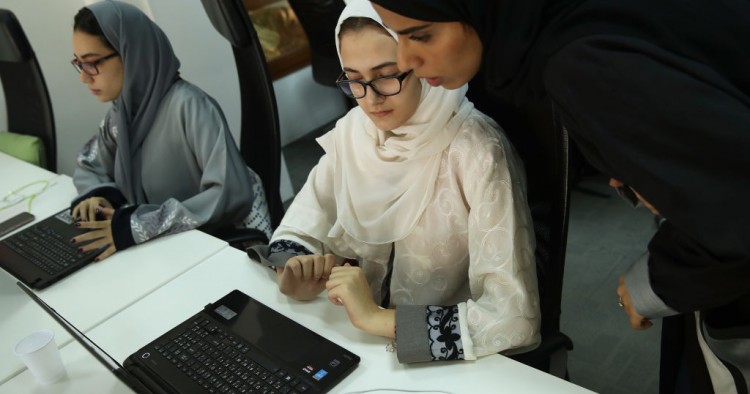The digitization of business in the Middle East has enormous implications for the future of regional economies, as well as for education, employment, and beyond. The way this digital transition shapes the region will be influenced by the degree to which policymakers consider this shift in its context and with an eye toward the future, as the opening session of the MEI Cyber Program’s recent conference explored. Expert panelists offered their assessment and predictions on the future of the region’s online economies and uplifted in particular the importance of government policies in facilitating a smooth and equitable digital transition.
A recurring theme and an important trend to watch is the role of structural economic change in this digital revolution, as has been made especially clear of late given the economic disruption caused by the COVID-19 pandemic. Fatima Alsebaie, an analyst at the Bahrain Center for Strategic International and Energy Studies, emphasized the value of technological prowess in overcoming the challenges presented by the pandemic. Bahrain, she noted, sees the digital economy as a new economy, but untapped technological opportunities such as fintech (financial technology) are vital to ensuring a smooth digital transition, especially since these technologies can facilitate public health interventions like contactless payment. In addition, women’s workforce participation can and should add enormous capital to the MENA regional economy by 2025, and state investments to improve women’s digital literacy and confidence are particularly crucial. Likewise, Selim Eddé, a panelist and director of government affairs and public policy for Google Middle East and North Africa, called upon regional governments to implement policies that are beneficial for small and medium-sized enterprises (SMEs) so that entrepreneurs can launch new businesses and bring existing enterprises into the online space. He argued that this is especially crucial for the tourism industry, which relies heavily on online tools to access new markets and finance.
Another critical point and area for future consideration is the potential of the digital economy to both streamline Middle East economies and present new areas for growth, opportunity, and employment. Panelist Ayman Ismail, an associate professor at the American University in Cairo, talked about the rapid digitization of the Egyptian economy, including recent positive developments such as online education and e-commerce. He argued that Egyptian and regional consumers are increasingly searching for digital solutions, and that Egyptian startups have proven resilient in pivoting to match new markets and surviving despite difficult economic odds. Ismail also addressed the critical role of venture capital, arguing that investors and incubators will find exciting opportunities in the Egyptian market. Panelist Najla al-Midfa, the CEO of Sheraa, the Sharjah Entrepreneurship Center, agreed that the COVID-19 crisis is a unique opportunity to grow the region’s digital economy and expand access to supply chains and tech talent. She also argued that government tech policy is especially crucial in Gulf states like the United Arab Emirates that are attempting to position themselves as regional and global cyber hubs. Al-Midfa advocated for stimulus packages and business support initiatives to ensure that the regional SME sector can thrive after COVID-19.
This panel provided a powerful opportunity to reflect upon both the critical value of digital services to modern economies and the importance of substantive policy initiatives in unlocking the full power of digitization. While economies across the MENA region have been hit hard by the pandemic, MEI’s panelists remained hopeful that this situation presents opportunities to expedite digitization and build a more resilient online market for the region.
To view the full panel remarks, visit MEI on YouTube.
Leo Hochberg is a recent graduate from Oberlin College in Ohio, majoring in Politics and MENA studies. His research focuses on refugee rights and human security. Leo has previously published through Heinrich Boell-Stiftung, a German policy think tank, and currently supports the MEI Cyber Program as an intern. Eliza Campbell is the Co-Director of MEI's Cyber Program, and a researcher in technology and human rights at the Center for Contemporary Arab Studies at Georgetown University. The views expressed in this piece are their own.
Photo by Sean Gallup/Getty Images
The Middle East Institute (MEI) is an independent, non-partisan, non-for-profit, educational organization. It does not engage in advocacy and its scholars’ opinions are their own. MEI welcomes financial donations, but retains sole editorial control over its work and its publications reflect only the authors’ views. For a listing of MEI donors, please click here.













